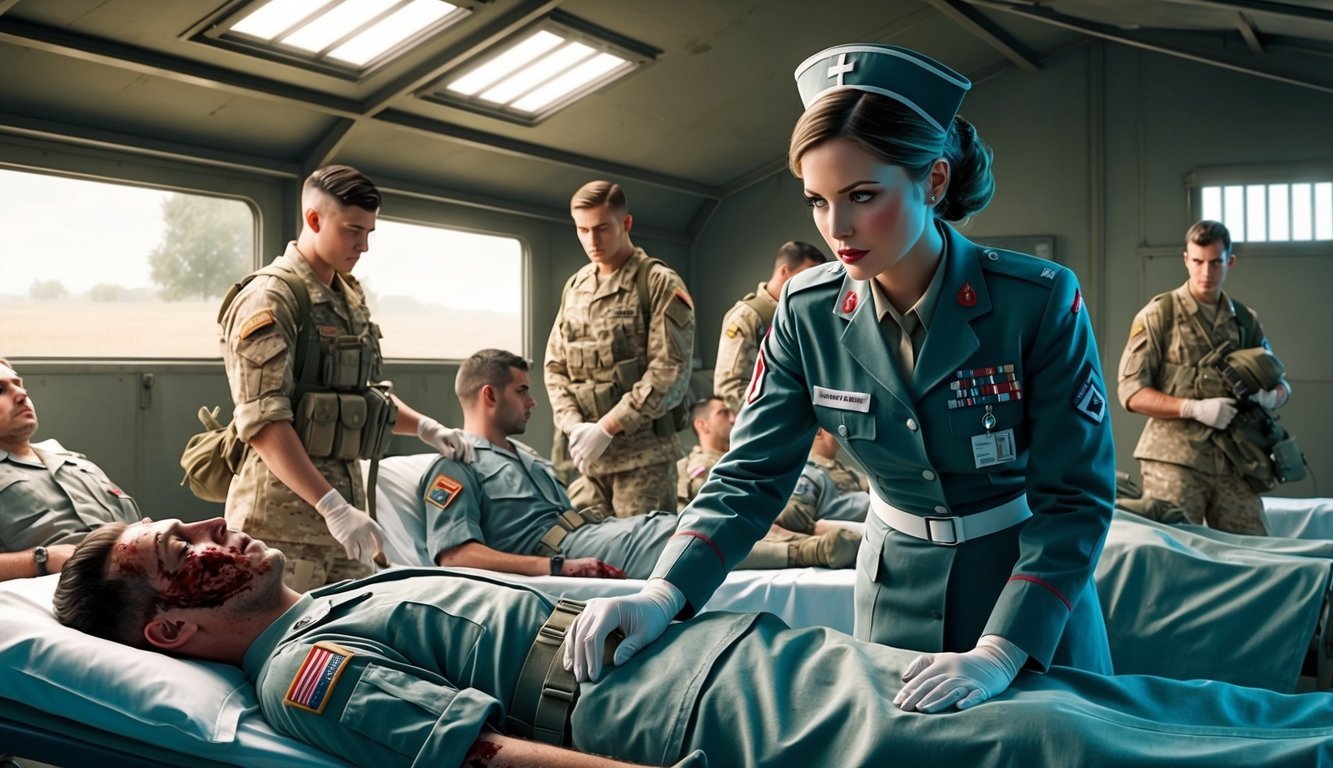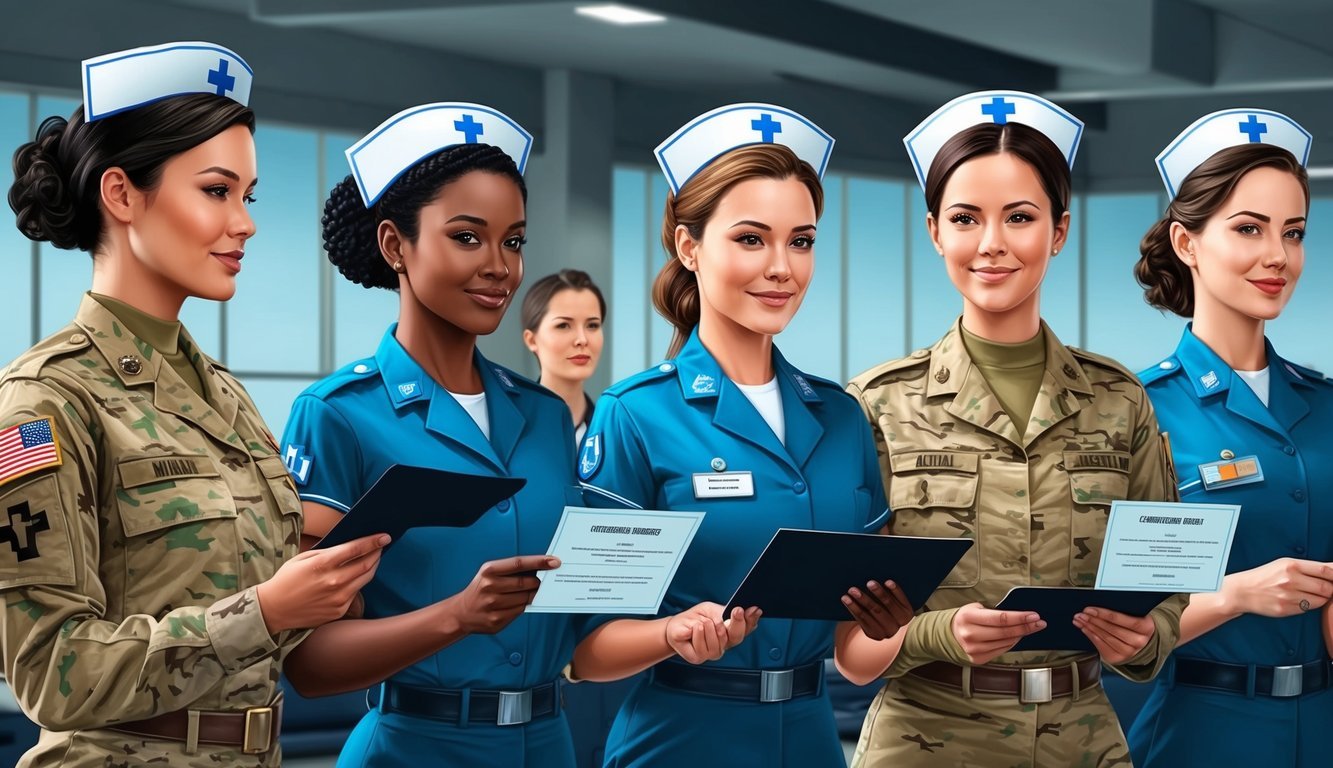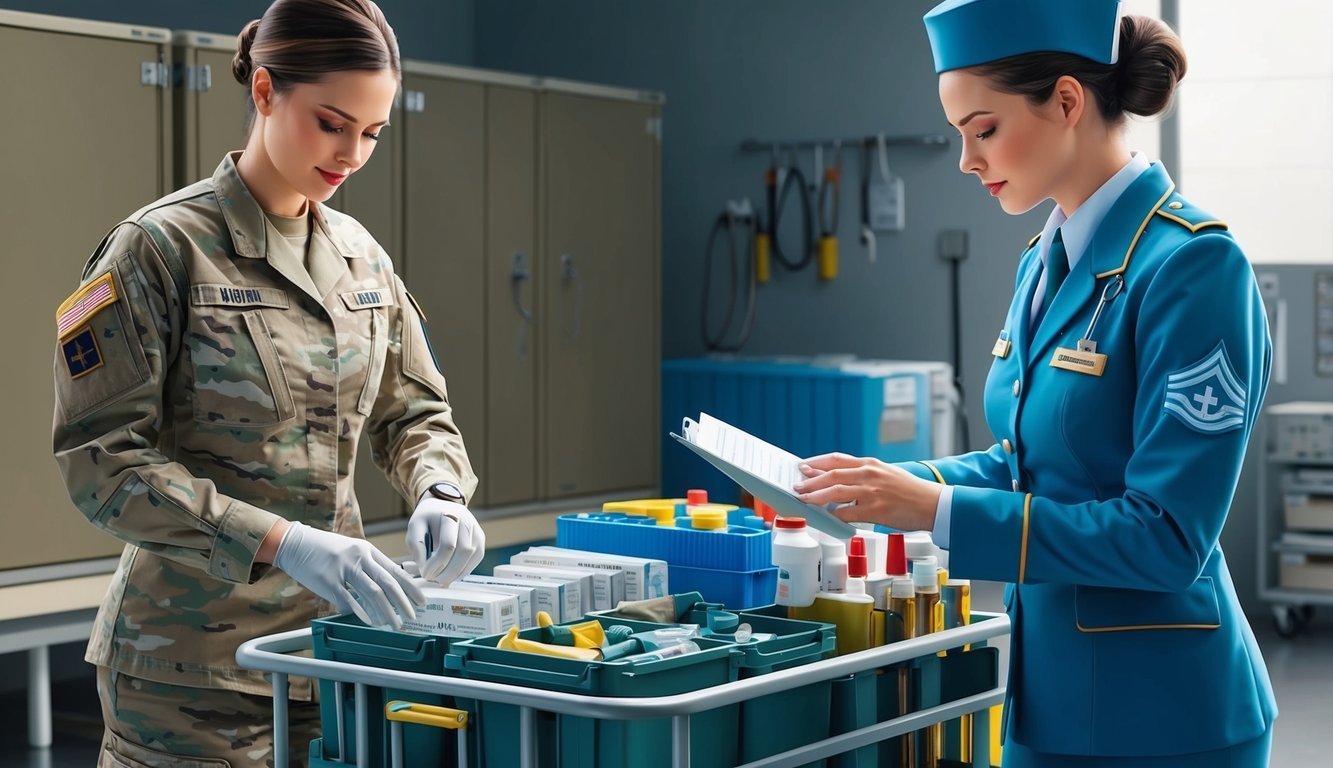Becoming a military nurse offers a unique opportunity to serve your country while pursuing a rewarding nursing career.
To become a military nurse, you typically need at least a Bachelor of Science in Nursing (BSN) and must be a licensed registered nurse (RN).
This role combines your passion for healthcare with the discipline and commitment of military service, making it a fulfilling path for many.
In addition to education requirements, military nurses must meet certain physical and mental standards.
They often undergo training that prepares them for the distinct challenges of providing care in various settings, including combat zones.
This specialized training helps develop the skills needed to excel as healthcare professionals within the armed forces.
The benefits of a military nursing career extend beyond just serving your country.
Military nurses enjoy competitive salaries, educational benefits, and the chance to gain valuable experience in diverse healthcare environments.
If you are considering this path, understanding the requirements will be essential to achieve your goals.
Key Takeaways
- A BSN and RN licensure are essential for a military nursing career.
- Military nurses receive specialized training to meet unique healthcare challenges.
- The role offers competitive pay and valuable experience in various settings.
Education and Licensure Requirements
To become a military nurse, you must meet specific education and licensure requirements.
This includes earning your degree and obtaining the necessary nursing license before you can serve.
Bachelor’s and Associate’s Degrees
You need a Bachelor of Science in Nursing (BSN) or an Associate Degree in Nursing (ADN) to start your career as a military nurse.
A BSN typically takes four years to complete at a college or university.
If you already have an ADN, you can enroll in an RN-to-BSN program, allowing you to earn your bachelor’s degree in 9-24 months.
Many military branches prefer nurses with a BSN due to the advanced training and leadership skills it provides.
Licensure and Examinations
After completing your nursing degree, you must obtain a nursing license.
This involves passing the National Council Licensure Examination for Registered Nurses (NCLEX-RN).
The NCLEX-RN tests your knowledge and skills to ensure you are qualified for safe and effective nursing practice.
Once you pass the NCLEX-RN, you can apply for a nursing license in your state.
Each state has unique licensing requirements, so be sure to check the local regulations.
Advanced Nursing Education
For those looking to advance further, a Master of Science in Nursing (MSN) can be beneficial.
An MSN is often required for specialized roles, such as a nurse practitioner (NP).
You may also find opportunities in military nursing to attend additional training programs or obtain certifications in areas like emergency nursing or family nursing.
These advanced qualifications can enhance your skills and career prospects in the military healthcare setting.
Military Service Commitments

When you decide to become a military nurse, you enter into specific commitments related to service.
These commitments include fulfilling duties as a commissioned officer, understanding branch-specific service obligations, and completing required training and deployment assignments.
Commissioned Officer Requirements
To become a military nurse, you must first meet the requirements for a commissioned officer.
This means you need to have a Bachelor of Science in Nursing (BSN).
You must also be a U.S. citizen and pass a background check.
After meeting these educational and legal prerequisites, you will need to attend Officer Training School (OTS).
This training takes place at locations like Maxwell AFB.
OTS helps you develop leadership skills essential for a commissioned role.
Once trained, you will receive a commission as an officer in the Army Nurse Corps, Navy Nurse Corps, or Air Force Nursing.
As a commissioned officer, your responsibilities will include not only patient care but also administrative duties.
Branch-Specific Service Obligations
Each military branch has different service obligations you need to fulfill.
In general, the initial service commitment for a military nurse is typically four years of active duty.
This may vary based on the branch and any special programs or scholarships you have entered.
Here is a brief overview of obligations by branch:
| Branch | Initial Commitment |
|---|---|
| Army | 4 years active duty |
| Navy | 4 years active duty |
| Air Force | 4 years active duty |
You should consult a military recruiter to discuss specific programs or incentives, which might affect your commitment length, such as educational scholarships or bonuses for longer service.
Training and Deployment
Once you are commissioned, you will undergo various training programs.
This includes clinical training, where you will gain hands-on experience in military medical facilities.
You may also participate in additional training related to combat or emergency care.
Deployment can happen at any time.
Military nurses support active-duty service members in various settings, including hospitals and field clinics.
Being prepared for deployment means being ready to provide care in diverse environments.
This could range from a base hospital to a combat zone, where adaptability is critical to your role.
Experience and Skills
To excel as a military nurse, specific experience and skills are vital.
You will need a strong clinical background, specialized knowledge in military nursing, and effective leadership abilities to thrive in various challenging environments.
Clinical Experience
Clinical experience is crucial for military nurses.
Engaging in diverse nursing care settings helps you build essential skills.
Working in critical care and trauma centers prepares you for the unique challenges of military healthcare.
Typically, you should aim for at least two years of practice in acute care settings.
This experience familiarizes you with fast-paced environments where critical thinking is required.
You may encounter patients with severe injuries, especially when assigned to combat zones.
Completing specialized training, such as in critical care nursing, can further enhance your qualifications.
This hands-on experience not only boosts your confidence but also equips you to handle medical emergencies effectively.
Specialization in Military Nursing
Becoming a military nurse requires specialized training tailored to the armed forces.
This specialization includes understanding military protocols, policies, and the types of injuries commonly sustained in combat.
Courses often focus on health assessment techniques specific to the battlefield.
Training may cover triage principles, treatment of trauma, and prevention of common military-related ailments.
The knowledge you gain in these areas is essential for providing effective care in high-stress situations.
Additionally, gaining experience in military-specific roles can benefit your career.
Programs might include rotations in different branches of military medicine.
Leadership and Healthcare Skills
Effective leadership is vital in the military healthcare setting.
As a military nurse, you will often lead teams and make quick decisions that impact patient care.
You should develop strong interpersonal skills to communicate effectively.
With clarity and persuasion, you can guide your team during emergencies.
Leadership training programs can enhance these abilities.
Furthermore, refining your management skills can help you supervise nursing staff in various healthcare situations.
Your role may involve coordinating patient care among different healthcare providers, especially in high-pressure environments.
Fostering a collaborative atmosphere will benefit both your team and patients.
This leadership aspect is critical for successful outcomes in any military or combat scenario.
Benefits and Opportunities
Being a military nurse offers various benefits and opportunities that can enhance your career and personal life.
From comprehensive healthcare options to unique educational opportunities, these advantages are designed to support you throughout your career.
Healthcare and Retirement
As a military nurse, you gain access to robust healthcare coverage.
This includes medical, dental, and vision benefits for you and your family.
The military health system is extensive and offers excellent care through facilities like V.A. hospitals and military treatment facilities.
In addition to healthcare, retirement benefits are significant.
You can earn a pension after 20 years of service, providing financial security for your future.
This pension is usually based on your years of service and salary, ensuring a stable income when you retire.
Educational and Professional Development
Military nurses have various opportunities for educational advancement.
Many programs focus on continuing education, allowing you to stay updated with the latest nursing practices.
You can also benefit from student loan repayment programs, which help ease the financial burden of nursing school.
These programs offer substantial loan repayment amounts in exchange for service commitments.
Additionally, military nursing provides pathways to higher degrees.
Through partnerships with educational institutions, you may pursue advanced degrees while serving.
Sign-on Incentives
Many branches of the military offer attractive sign-on bonuses to attract skilled nurses.
These bonuses can range from several thousand dollars to more than $20,000, depending on your specialty.
In addition to bonuses, there are often incentives for specific fields, such as critical care or mental health nursing.
These incentives can significantly enhance your financial package when joining.
You may also receive support in relocating, which can make the transition to military life smoother.
With all these opportunities, a career as a military nurse can be both fulfilling and financially rewarding.
Certifications and Training Programs

As a military nurse, obtaining the right certifications and training is crucial.
These qualifications ensure that you are prepared for the unique challenges you may face in military environments.
Life Support and Trauma Training
You must acquire several life support certifications to provide effective care in emergencies.
Basic Life Support (BLS) training is essential, as it covers fundamental resuscitation techniques.
This includes CPR and using an automatic external defibrillator (AED).
Acute Cardiac Life Support (ACLS) is another critical certification, focusing on managing cardiac arrest and other cardiovascular emergencies.
For those working with children or in pediatric settings, Pediatric Advanced Life Support (PALS) is vital, providing specific protocols for treating young patients.
These certifications not only enhance your skills but also prepare you for the high-pressure situations common in military nursing.
Advanced Military Training
In addition to life support certifications, advanced military training is a key component of your preparation.
This training often includes courses specific to military nursing, such as trauma and critical care care.
You might also engage in specialized training for roles in the Air Force Reserve.
Participating in military simulations helps develop your ability to respond effectively in combat situations.
Critical Care Nurse training is also available, ensuring you are equipped to care for patients in military hospitals or during deployments.
This advanced training strengthens your clinical skills and enhances your ability to lead in emergency situations.
Being well-trained improves your readiness to serve effectively in the military context.
Frequently Asked Questions

Understanding the requirements to become a military nurse can bring clarity to your path.
Below are some common questions regarding education, age limits, training, and more that potential candidates often ask.
What are the educational qualifications needed to become a military nurse?
To become a military nurse, you must earn a Bachelor of Science in Nursing (BSN).
This degree takes about four years to complete.
If you already have an Associate Degree in Nursing (ADN), you can enroll in an RN-to-BSN program to earn your BSN in about 9 to 24 months.
More details can be found here.
What is the age limit for enlisting as a nurse in the military?
The age limit for enlisting as a nurse varies by branch but generally ranges from 21 to 42 years old.
Meeting this age requirement is crucial to your application process.
Check specifics for each branch to understand the exact age limits.
Is basic training required for nurses joining the military?
Yes, basic training is required for nurses who join the military.
You will undergo officer training, which includes military skills and procedures as well as leadership development.
This training prepares you for the unique challenges of military nursing.
What are the physical fitness requirements for army nurses?
Army nurses must meet specific physical fitness standards, which include height and weight requirements.
You will need to pass a physical fitness test that focuses on endurance, strength, and agility.
These standards ensure that you are fit for the demands of the role.
How much time is typically required to complete a nursing degree through a military program?
Completing a nursing degree through a military program generally takes about four years for a BSN.
If you are starting with an ADN, you can expect to finish an RN-to-BSN program in 9 to 24 months.
Many military programs do provide additional support for education.
Which branch of the military is most recommended for nursing careers?
The Army, Air Force, and Navy all offer nursing opportunities.
However, the choice may depend on your preferences and career goals.
The Army Nurse Corps is one of the largest and offers extensive support for nurses.
Each branch has unique benefits and career paths worth considering.

